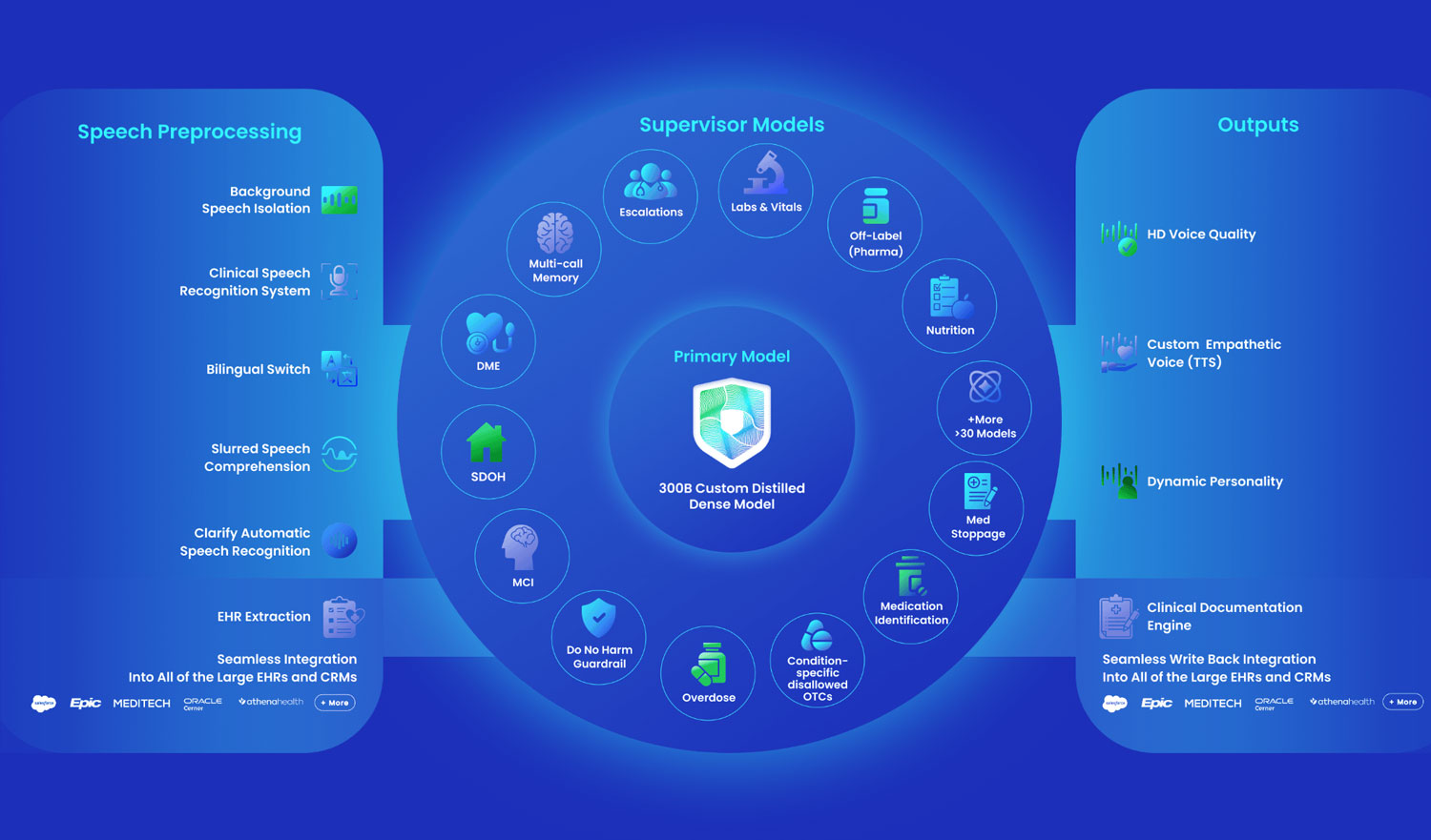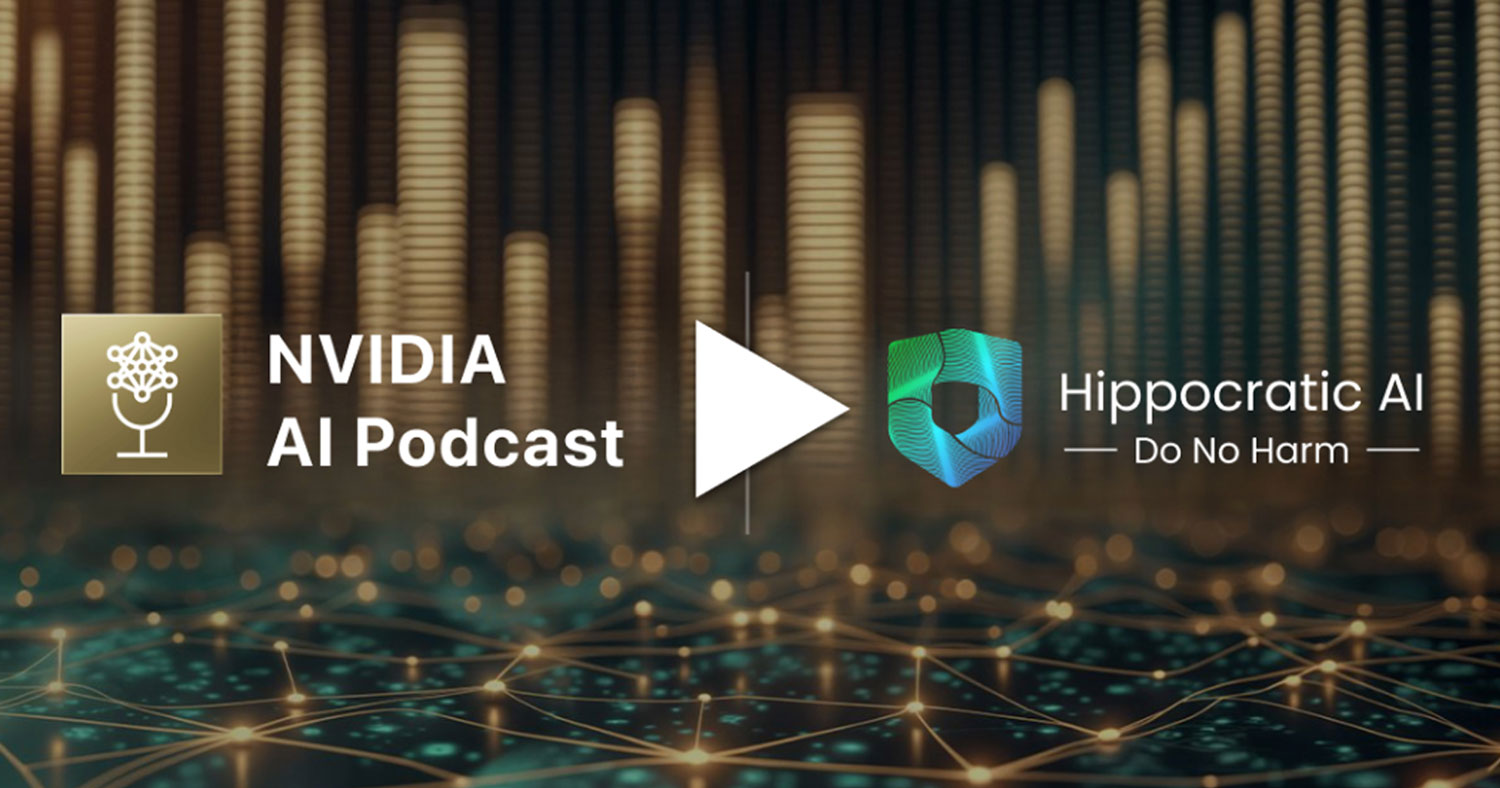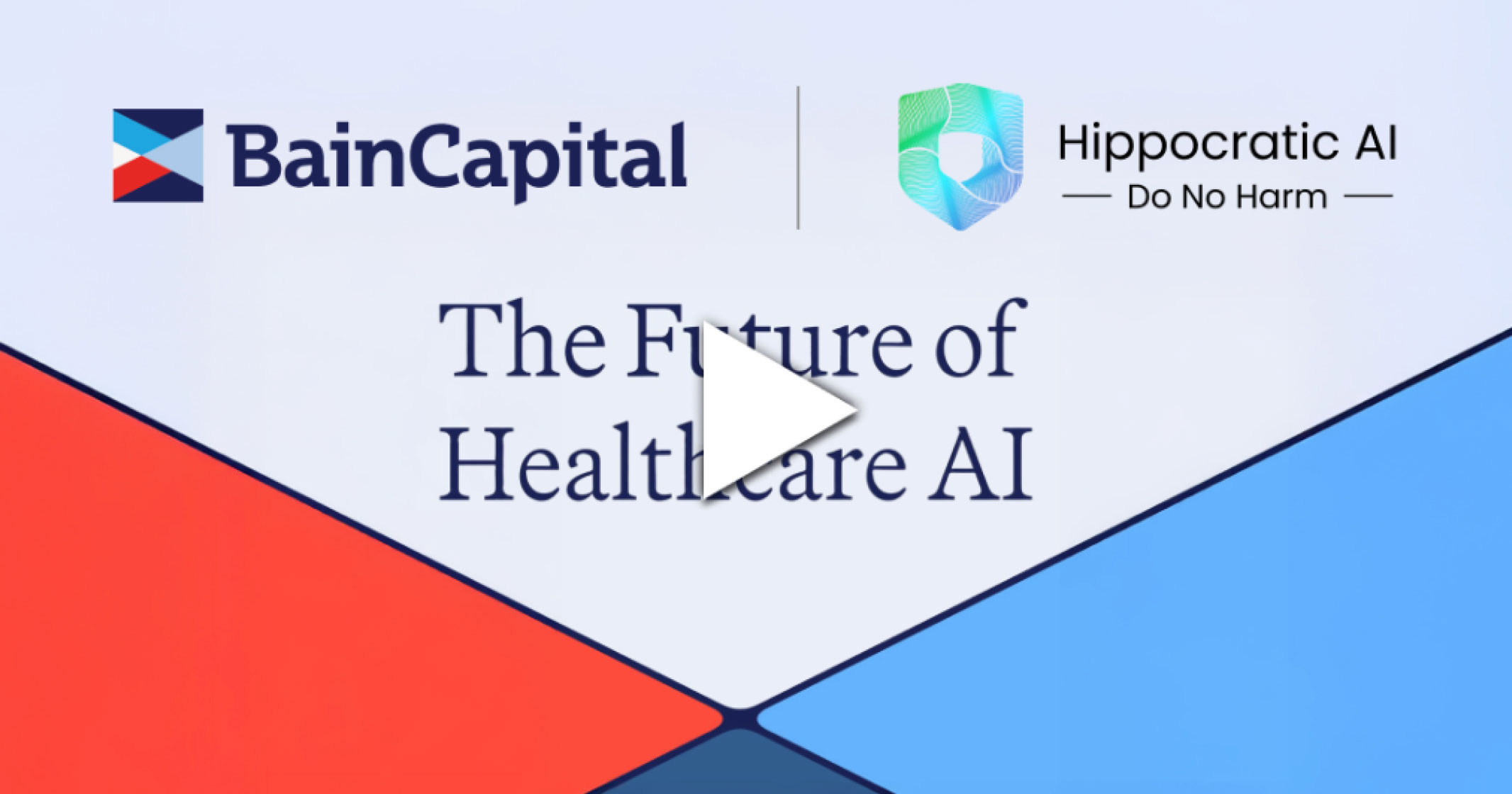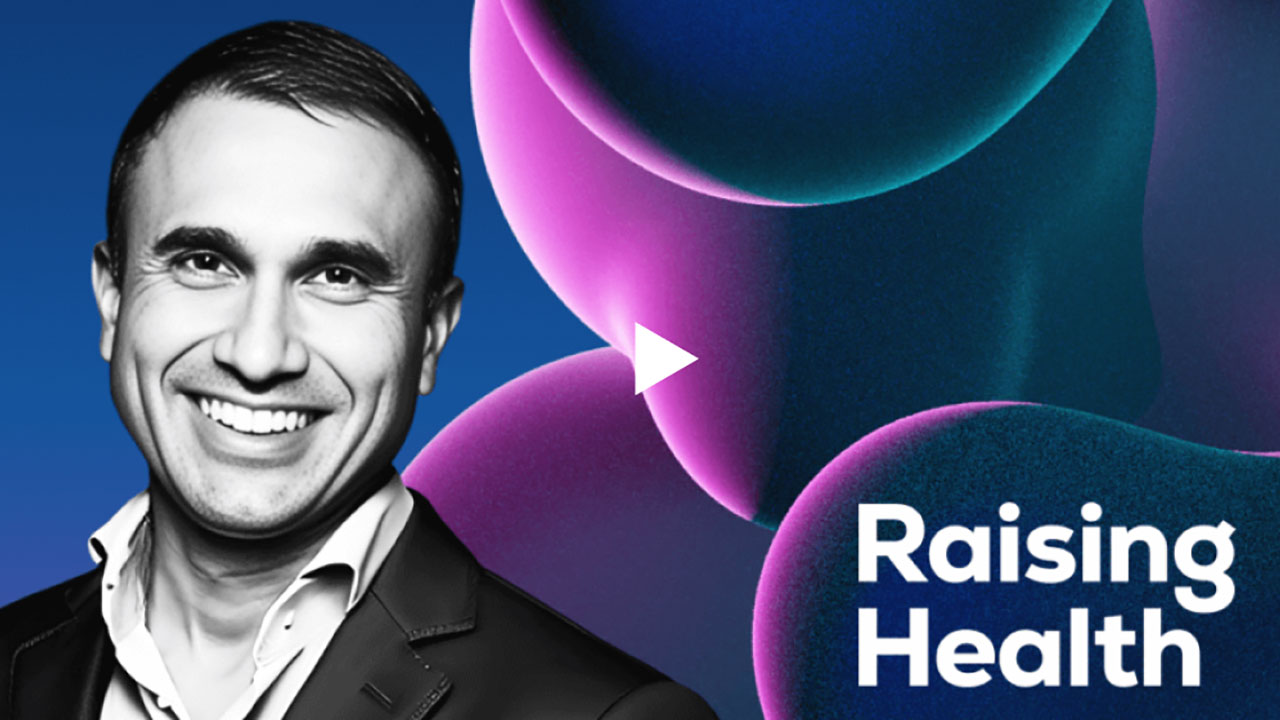Polaris Safety
Constellation Architecture
We use a novel 4.1T+ parameter constellation architecture where specialized support models increase medical accuracy and safety.


Read the Original Seminal Paper About Polaris
We developed Polaris, the first safety-focused LLM constellation for real-time patient-AI healthcare conversations. Unlike prior LLM works in healthcare focusing on tasks like question answering, our work specifically focuses on long multi-turn voice conversations.
Other Research Papers
The deployment of artificial intelligence (AI) in healthcare necessitates robust safety validation frameworks, particularly for systems directly interacting with patients. While theoretical frameworks exist, there remains a critical gap between abstract principles and practical implementation. Traditional LLM benchmarking approaches provide very limited output coverage and are insufficient for healthcare applications requiring high safety standards.
Real-World Evaluation of Large Language Models in Healthcare (RWE-LLM): A New Realm of AI Safety & Validation
Colorectal cancer (CRC) screening rates remain disproportionately low among Hispanic and Latino populations compared to non-Hispanic White populations. While artificial intelligence (AI) shows promise in health care delivery, concerns exist that AI-based interventions may disadvantage non–English-speaking populations due to biases in development and deployment.
Using a Multilingual AI Care Agent to Reduce Disparities in Colorectal Cancer Screening
Today’s nursing practice is suffering from challenges related to workforce shortages, increasing patient complexity, and administrative burdens- leading to one of highest burnout among all professions. The integration of artificial intelligence (AI) in healthcare can support a transformative development in modern nursing practice, addressing many of these challenges.
Advancing nursing practice through artificial intelligence: Unlocking its transformative impact
Healthcare professionals face an urgent need for AI literacy as artificial intelligence technologies rapidly transform clinical practice, yet nursing-specific educational resources remain scarce. The objective of this study was to evaluate the effectiveness of an innovative micro-learning AI education program developed through an academic-industry partnership.
Transforming healthcare AI education through micro-learning: A novel partnership model for nursing workforce development.
Podcasts
With 1.8 million patient calls completed* and an 8.95/10 satisfaction rating, Hippocratic’s safety-focused LLM frees up more time for clinicians to provide care. Learn about our constellation architecture, which uses 22 models for safety validation, and how the AI agent app store enables clinicians to scale key aspects of their expertise.
*At time of podcast. We have over 7 million clinical calls currently.
Videos
Watch the interview where Munjal talks with Vedant Agrawal of Premji Invest about how our team used this constellation of models to create a modular, redundant, and yet flexible architecture to cater to patient safety at the highest level.
“As part of Jensen’s keynote speech for GTC, Hippocratic AI was a featured company. Watch this short clip of Jensen speaking about our company and the work that we are doing. This was a proud milestone for us!”
If you ever wanted to know how we partnered with our investors to create Hippocratic AI, watch this long form video with Hemant Taneja of General Catalyst that does a great job capturing how it just takes one conversation to propel an idea to something truly transformative in how we provide care. It’s a great nod to how we need to co-design and collaborate with those in the ecosystem to make this work and how we need great partners like General Catalyst a16z, to help us lay the foundation.
Hippocratic AI cofounder and CEO Munjal Shah joins a16z Bio + Health general partner Julie Yoo to explore the incredible potential of generative AI in transforming healthcare delivery. Together, they discuss the emerging “voice renaissance” in healthcare, the nuances of designing safe and empathetic AI interactions, and how Hippocratic AI is addressing safety concerns with innovations like multi-LLM architecture and rigorous training with thousands of nurses.
Blog
Since the advent of modern computing, we’ve witnessed several evolutionary phases, driven by advances in processing power, interfaces, techniques, and processes. We are now entering the latest phase: agentic engineering.
The Agentification of Software Development
The Economist featured Hippocratic AI’s Co-founder and Chief Scientific Officer, Subhabrata Mukherjee, in their Agentic AI Advantage report. Read more about how Hippocratic AI is an effective solution for delivering results.
The Agentic AI Advantage:
Deploying AI Agents for Growth and Innovation
Generative AI is transforming healthcare, but ensuring safety and reliability remains a critical challenge. We are excited to introduce a groundbreaking approach to AI safety validation called Real World Evaluation of Large Language Models in Healthcare (RWE-LLM), developed by Hippocratic AI.
New Realm of AI Safety
Our new executives bring deep expertise from pharma, payors, providers, ambulatory care, and government, as well as international and emerging markets. Their collective experience will fuel Hippocratic AI’s continued momentum.
New Exec Hires for Expansion
In celebration of our two year milestone, we’re excited to announce the launch of Polaris 3.0, our most advanced and safest healthcare LLM constellation to date. Polaris 3.0 represents a groundbreaking leap forward.
Polaris 3.0 Safety Constellation Architecture
The Hippocratic AI Spotlight Series features in-depth interviews with the key team members who are propelling our mission to deliver healthcare abundance on a global scale. Our cross-disciplinary team span clinical, research, engineering, and product expertise.
Spotlight Series: Michelle Voisard
Patients deserve care that meets them where they are and accounts for their motivations, environment, preferences and beliefs. Simple measures, such as calling a patient at a better time or asking which channel of communication best suits them all go a long way in improving a patient’s health.
Personalized Interactions
As part of a monthly check-in program, our AI agent recently contacted a 74-year-old male who had a past medical history significant for hypertension, chronic kidney disease (CKD), and vitamin D deficiency. During this outreach, he reported that he had slipped on ice the previous day…
Supporting Vulnerable Populations
Healthcare is built on trust, connection, and the ability to understand individual patient needs. Yet, as technology takes center stage in revolutionizing care, there’s a growing challenge: how do we maintain empathy and humanity?
Human Touch in AI
Read the first in our series around the art of speech technology. Artificial Intelligence is poised to become a transformative force in patient care. Although AI provides unparalleled efficiency, precision, and speed, it needs to also have an empathetic touch.
Empathetic Intelligence
A recent call by our AI agent to a 78-year-old woman revealed that she had elevated blood pressure during her last physician visit. While she did not report clinical symptoms of a hypertensive emergency, our AI identified the profoundly elevated blood pressure for immediate escalation.
Preventing Hypertensive Crisis
As AI continues to transform industries, healthcare has emerged as one of the most promising areas for AI-powered solutions. While AI has traditionally been associated with complex tasks like medical diagnostics or data analysis, it is now being utilized in more patient-facing interactions.
Empathy in Action
Our First LLM Patent
AI Agent Breaks Barrier to Care
Bridging the Gap with GenAI
In collaboration with WellSpan Health, we’ve launched our AI care manager to address the screening gap. Our AI agent, named Ana, is designed to conduct targeted outreach to at-risk patients, with a particular focus on Spanish-speaking populations.
Closing the Care Gap
“My chest hurts and I can barely take a breath”. Fortunately for this 65 year old female, a generative AI powered HAI healthcare agent had called to check on her. The agent asked appropriate questions and immediately escalated her to a nurse. She was emergently admitted to the hospital. Possibly the first life saved by an AI agent intervention.
Polaris Safety in Action
Polaris 1.0



